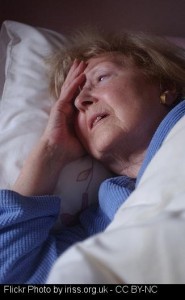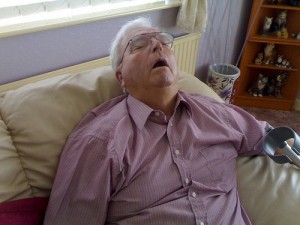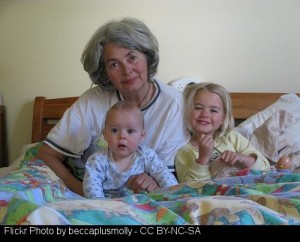By CYN LoPINTO
Editor-in-chief, gerontologist
 Does a good night’s sleep seem like a fond, yet distant memory? Nights spent lying in bed stressing over the amount of sleep you AREN’T getting can really take its toll. You mull over all the things needed to be accomplished the following day and dread how tired you will feel when that morning alarm goes off. When did sleeping become so difficult?
Does a good night’s sleep seem like a fond, yet distant memory? Nights spent lying in bed stressing over the amount of sleep you AREN’T getting can really take its toll. You mull over all the things needed to be accomplished the following day and dread how tired you will feel when that morning alarm goes off. When did sleeping become so difficult?
As we age, our sleep patterns change. According to the National Institutes of Health, while older adults may get the same amount of sleep as they did when they were younger, the amount of time spent in deep sleep is less. There are two types of sleep. The first is non-rapid eye movement (NREM) sleep or dreamless sleep. This type has four different stages ranging from light to deep sleep. Then we go into the rapid eye movement (REM) stage where dreaming takes place. This is when we get our most regenerative sleep. We cycle back and forth between these two types numerous times throughout the night.
When we get older we spend more time in the lighter stages of sleep than in the deeper stages. We may actually spend more hours in bed sleeping but don’t wake up feeling refreshed. This is often due to something called sleep fragmentation, or waking up during the night. This problem can occur because of many reasons. Often it is due to an increase in the need to get up multiple times to urinate during the night. It can also be pain (arthritis restless leg syndrome, osteoporosis, etc.) that is interrupting you. A more serious condition that you shouldn’t ignore is sleep apnea. Talk to your doctor if you suspect that this is an issue. As a group, menopausal women often complain of poor sleep habits. Here, hormonal changes can cause hot flashes and muscle pain making sleep a real challenge. Environmental factors may also be the culprit such as too much light in your bedroom, distracting nearby electronic devices, or snoring.
 The time it takes to fall asleep (sleep latency) also increases, and hours and hours can go by just lying in bed trying to drift off. If you feel anxious and overwhelmed when you crawl into bed, adopt a ritual or two to help you destress. Maybe your “to do” list is weighing heavily on your mind. Try writing it down before bedtime. Sometimes putting a pen to paper allows your brain to relax. Worry from work-related issues and family situations can also keep you up at night. If it is taking you longer than 20 minutes to fall asleep, don’t beat yourself up about it Get up and read or watch some boring tv show and try again.
The time it takes to fall asleep (sleep latency) also increases, and hours and hours can go by just lying in bed trying to drift off. If you feel anxious and overwhelmed when you crawl into bed, adopt a ritual or two to help you destress. Maybe your “to do” list is weighing heavily on your mind. Try writing it down before bedtime. Sometimes putting a pen to paper allows your brain to relax. Worry from work-related issues and family situations can also keep you up at night. If it is taking you longer than 20 minutes to fall asleep, don’t beat yourself up about it Get up and read or watch some boring tv show and try again.
One factor that affects falling asleep as we age is eating too close to bedtime. With most of us living such a fast-paced lifestyle, dinner is often later than we wish. Try to plan out meals ahead of time so you aren’t scoffing down your dinner and then climbing into bed. While this might not have been an issue when you were younger, it is now. Heartburn and acid reflux can flair up and cause sleepless nights. Some people have trouble going to bed on an empty stomach and find they sleep better if they have a light snack late in the evening. Listen to your body and see what works best for you. Other consumptions that work against getting a good night’s sleep are sugar, alcohol, caffeine and tobacco. Avoid these late in the day or try to limit their use altogether. Also, talk with your doctor about any medications you are on that may be causing symptoms of insomnia. This is an important issue with older adults since the number of medicines taken by seniors are substantial. Sleep problems are listed as a side effect on many prescription and over the counter medicines.
 Changes also occur with our circadian rhythm (the body’s clock) as we age. Older adults tend to feel more tired in early evening and wake up earlier than younger adults. This name for this pattern is advanced sleep phase syndrome. The rhythm is actually moved forward. Since bedtime is earlier, once the 7-8 hour sleep mark is achieved, wake up time is earlier. But because the quality of sleep isn’t as deep as when they were younger, many older adults nap during the day. This can cause even more issues with insomnia. While many health officials agree that the “power nap” (usually 20 minutes or less and taken mid-day) is beneficial for energy and sharpness, long naps can really interfere with sleep.
Changes also occur with our circadian rhythm (the body’s clock) as we age. Older adults tend to feel more tired in early evening and wake up earlier than younger adults. This name for this pattern is advanced sleep phase syndrome. The rhythm is actually moved forward. Since bedtime is earlier, once the 7-8 hour sleep mark is achieved, wake up time is earlier. But because the quality of sleep isn’t as deep as when they were younger, many older adults nap during the day. This can cause even more issues with insomnia. While many health officials agree that the “power nap” (usually 20 minutes or less and taken mid-day) is beneficial for energy and sharpness, long naps can really interfere with sleep.
Small lifestyle changes can really help in getting great sleep. Exercise is a key ingredient for those older adults who report positive sleep patterns. Working out during the day is ideally the best time. If you exercise close to bedtime, it can actually stimulate your body and have the opposite effect. Sleep experts say to try to go to bed at the same time each night and wake up the same time each morning to help get on a schedule. Use your bed for only sleep or sex. It is not an office or kitchen. Also be aware of what you are reading or watching on television before you lay down at night. Violent and disturbing material can upset you and affect your ability to fall asleep. How many of us watch the nightly news before bed and wonder why we feel anxious as we try to drift off to sleep?
 Sleep is a very important part of our lives and lack of sleep affects all areas of our life. Sleep deprivation has been linked to depression, obesity, stroke, diabetes, hypertension and memory issues. It can make you feel overwhelmed and limit your ability to cope with what is going on around you. Good sleep results in a better quality of life. While we may not be able to do anything about the physical changes in our pattern of sleep as we age, we can try to work with these changes. These are normal, and knowing that there will be nights when we may not get the amount of sleep we hope for, is alright. Don’t drive yourself crazy when you have one of these nights. Just try a different strategy the next night. Realizing that this new way of sleeping is normal as we get older can take the pressure off. Just relax, close your eyes and zzzzzzzzzzzzzz.
Sleep is a very important part of our lives and lack of sleep affects all areas of our life. Sleep deprivation has been linked to depression, obesity, stroke, diabetes, hypertension and memory issues. It can make you feel overwhelmed and limit your ability to cope with what is going on around you. Good sleep results in a better quality of life. While we may not be able to do anything about the physical changes in our pattern of sleep as we age, we can try to work with these changes. These are normal, and knowing that there will be nights when we may not get the amount of sleep we hope for, is alright. Don’t drive yourself crazy when you have one of these nights. Just try a different strategy the next night. Realizing that this new way of sleeping is normal as we get older can take the pressure off. Just relax, close your eyes and zzzzzzzzzzzzzz.
Cynthia Lopinto
Latest posts by Cynthia Lopinto (see all)
- Honey Chocolate–Covered Pretzels - April 3, 2018
- True Colors - April 3, 2018
- Spring Cleaning…You’ve Gotta Be Kidding - April 2, 2018
- Should You Stay In Your Home Or Move During Retirement? - April 2, 2018
- Hawaiian Plants For Good Health - April 2, 2018
 Home Front Magazine A Publication for Seniors
Home Front Magazine A Publication for Seniors

